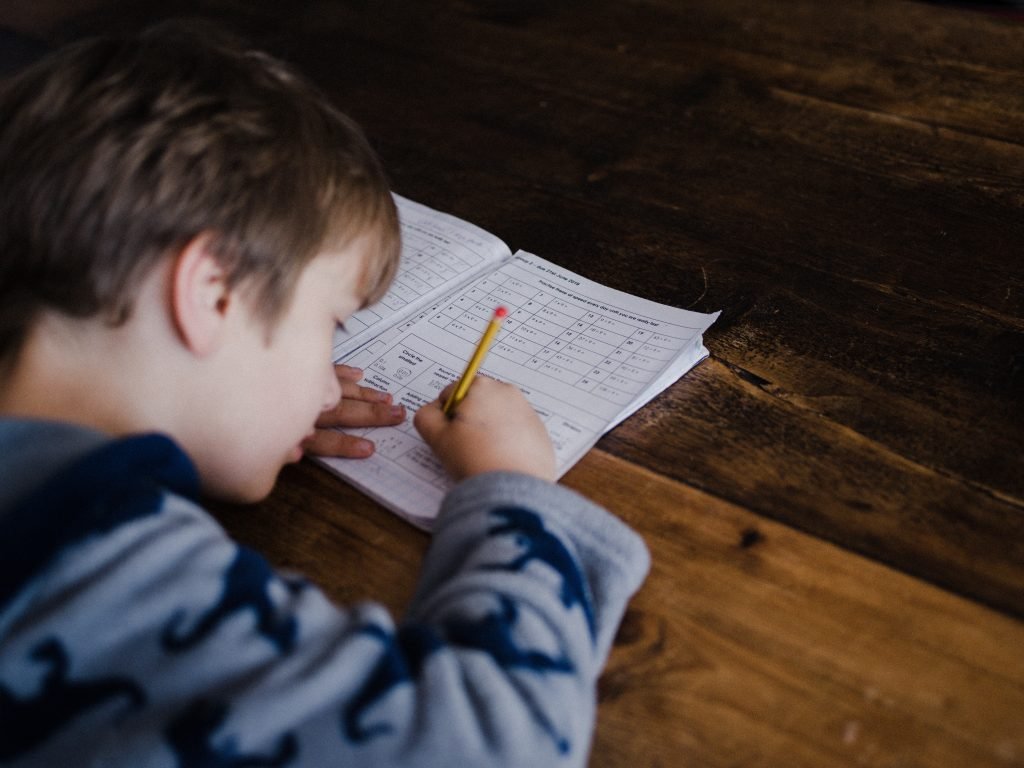Mathematics, especially algebra, is a subject that every child needs to learn. To help with their schooling, parents can teach their kids basic concepts of algebra.
But how can parents do it efficiently? Here are some of our tips for you to introduce algebra to your children.
1. When can we start learning algebra?

The majority of children can acquire math skills as soon as they turn five. At this age, parents should teach them how to count and read numbers first.
5-year-old children can learn to count to 100 and read up to 20. You should keep your kids entertained all the time while learning maths.
Parents can opt for small games, like dices, ladder games or chutes to help with learning. A good set of basic mathematical skills will be advantageous for children later on.
2. Help with their maths homework

One of the most popular ways to teach your child algebra is to help them deal with their homework. By resolving practical problems, your child will memorize algebra quicker.
Parents can check on their kids’ math homework, tests or quizzes given by the teachers. There are likely some problems that have not been solved or done wrongly.
You can ask your children to redo those problems with you. Try to explain them step by step, and live demonstrations if necessary.
The majority of maths teachers would appreciate the active involvement of parents in student’s education. Parents can exchange information with their children’s teachers to help them learn things better.
From homework and tests, you can also find other algebra problems that are similar to those your children have difficulty with.
By observing them do these quizzes, you can find out why your kids are having trouble with them. From that, you can help them learn algebra correctly.
Make sure that you have the answer keys, and have checked them through. False information will be troublesome.
Practice makes perfect, a few times doing algebra problems will give your child a better understanding of the concept of algebra.
3. Algebra is nothing to fear of
Not every kid is gifted with mathematics intelligence or has a good impression with algebra at first sight. Some of them even find it terrifying and try to get away without completing maths work.
To teach your child algebra efficiently, parents must first help him or her come to like the idea of algebra. Try to make algebra a normal part of his or her daily life.
By using small games involving calculations or asking them to count numbers occasionally, children will naturally familiarize themselves with math concepts.
4. Algebra is about the patterns

Algebra has a repetitive nature, so if you know the patterns of it, things will be much easier.
Math problems can resemble each other – it’s called types of problems. So by repeatedly solving one type, children will get the idea of how to do it correctly.
Therefore, parents should find out what types of questions your children have difficulty with. Then, you can search for quizzes and problems that are similar.
Get your kids completed them with thorough explanations and instructions. By repeating the solving process, they will soon understand properly the function of algebra.
5. Ask the kids to read the problem first

Some children start learning algebra with a tendency to read the problem while solving them. They say that in this way they can solve the problem faster.
A lot of parents and teachers do not pay enough attention to this. The problem can be tricky and misleading, so reading and solving at the same time is difficult, even for adults.
Instill your kids with the habit of reading the whole problem before doing anything. Make sure they underline or highlight the key information and numbers in the problem.
This way, they would be able to avoid any mistakes from misunderstanding or rushing the solving. Also, this will teach kids about patience and caution.
6. What is X, Y or N?
Some first-timers look confused when reading a problem. They see a lot of numbers and X, Y or N.
Some of them ask their parents, only to get a reply “X is X, you need to find it!”. This is too vague and abstract for kids to even understand.
Unknowns are all over equations and problems in algebra. Surely your kids will have to get to understand their function, but first, you can help them do it easier and quicker.
Parents should explain what is X in a simple and easy-to-understand way. It can be “X is called the unknowns. You see, X is the missing number we need to find.”
“For example, you lost a piece in a puzzle painting somewhere in the house, so the painting is not completed. You got to find that piece to fit into the painting. X is the piece, and the painting is the equation.”
Following, there will also be other algebra terms such as signs, symbols, and substitutions. Parents have to explain all of them and their functions in a comprehensive manner.
Parents must be patient to give an explanation to every single thing, even though it is obvious to you. Remember, it is not you learning algebra, it is your kids.
7. Cross multiplication can help

If your children are struggling with algebra, especially problems with fractions, cross multiplication is helpful.
Equations with fractions on both sides are surely confusing for beginners. However, by multiplying the denominator on the left with the numerator on the right and vice versa, the fractions will be eliminated.
Then, the equation will be simple enough for a child to make calculations. It is not that algebra is difficult for kids, you just don’t know enough tricks to make it easy.
8. Let’s eliminate the negative
Some problems involving negative numbers and equations. Solving them is confusing and daunting at some points for small children.
So, the best way is to eliminate the negative if the equations have too many minus signs. Just by multiplying the whole equation with -1, the signs will be reversed. Then, all you have to do is solve it normally.
9. Technology assistance

There is nothing technology can not help you with, including teaching your children algebra.
Just a few minutes searching on your phone, you can find thousands of mobile apps related to algebra and children maths teaching. Most of them are even free.
When your children understand the basic principles and patterns of algebra, the apps will help them revise. If your child still finds algebra difficult, the app can provide an interactive and exciting environment for him or her to learn.
Mobiles apps often contain practice problems and available answer keys for both parents and children to learn from. Useful algebra apps for children can be found on Google Plays, iTunes or App Store.
10. Visual learning
Maths books are still useful, but nowadays children prefer learning methods with catchy visuals. They seem to be more appealing and encouraging than the endless number and figures in the exercise sheets.
First, parents can search for algebra worksheets with funny illustrations and online games. The worksheets can be printed out, or done online. Games and activities are similar.
You can let your kids hold a learning group with their friends doing these activities. This will help them to be more active, and still have fun while learning algebra.
Second, go to Youtube. Parents can find various exciting videos introducing algebra on Youtube, aiming to help children learn better.
Basic maths concepts are not abstract anymore with funny explanations and examples. Introduction to algebra is a cute and vivid video that will get your kids laughing all the time. You can watch it below.
Parents can use these videos to understand algebra properly and how to teach it correctly. Mathantics is a Youtuber providing algebra-based lessons and materials, suitable to be a reference source for parents.
11. Keep contact with your kid’s teacher

Associations between parents and teachers play an important role in children’s education. It is indeed a fact.
Learning algebra is a long-term process happening in the classroom and at home. Talking with the teacher will help both sides – parents and school – have a better idea of how to accelerate the learning progress of children.
Teachers can tell you the strong points and weak points of your kids, and even offer tips or materials for you to teach your children at home.
On the other hand, parents can follow up on the homework, and find out if their kids don’t understand something, sometimes they are too shy to ask their teacher. Parents can be the bridge between teachers and children.
Besides, keeping contact with the teacher is necessary in case your children show any sign of lagging behind. Then, both parents and teachers can provide extra tutoring to help them.
Algebra can be daunting for small kids, but it is not that hard when you actually get down to work with your children. Be patient and creative, so you can help your kids advance in algebra learning.





